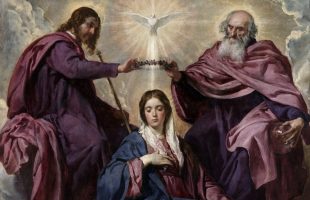III. Reading Mary in Luke
A. The Lord Is With You
We turn now to Luke’s Gospel.
We want to look closely at his account of the Annunciation (see Luke 1:26-38). Here again we simply want to read the literal text in its literary context. As it is written, we want to know what this passage tells us about Mary.
Luke, like Matthew, introduces Mary as a virgin betrothed to Joseph, a descendant of David. She is greeted by the angel Gabriel: "Hail, favored one, the Lord is with you."
The angel uses a word - variously translated hail or rejoice - that the prophets used to foretell the joy of the people at the Messiah’s coming (see Joel 2:23-24; Zechariah 9:9).
In fact, the angel’s announcement seems to be drawn almost word-for-word from a prophecy of Zephaniah (see Zephaniah 3:14-18)
| Luke 1 |
Zephaniah 3 |
| Hail, | Shout for joy, |
| favored one! | O daughter Zion! |
| The Lord | The King of Israel, the Lord |
| is with you. . . . | is in your midst . . . |
| Do not be afraid, Mary | Fear not, O Zion . . . |
| You will conceive in your womb | Your God is in your midst, |
| ...[the] Son of the Most High | a mighty savior |
Luke seems to be depicting Mary as Daughter Zion - the representative of her people - called to rejoice that God, as her Savior and King, has come into her midst.
As in Matthew, then, we see the historic hopes of Israel focused in the person of Mary. The words the prophets taught Israel to long to hear - "Say to daughter Zion, your Savior comes!" (see Isaiah 62:11) - are heard now by Mary.
The angel also tells Mary that her Son will be "Son of the Most High" and will be given "the throne of David His father."
For the literal meaning of this passage, we have to return to the Old Testament background of God’s covenant with David
In fact, in the angel’s words we hear echoes of God’s covenant with David (see 2 Samuel 7:12-16; Psalm 89:4-5; 27-30).
God swore that David’s son would be "a son to Me." And the angel promises that Mary’s child will be "Son of the Most High" - another way of saying "Son of God" (see Mark 5:7;Luke 1:35; 8:28).
God swore that David’s son would rule on his throne forever. The angel promises that Mary’s Son will be seated on "the throne of David his father…forever."
Mary is shown here to be the "sign" that Jesus is the long-awaited Messiah from David’s dynastic line.
B. Handmaid of the Lord
We’ll focus on other elements of Luke’s Annunciation story in future lessons. For now, let’s jump ahead to the conclusion of Luke’s account.
Mary has asked how she, as a virgin, will conceive the child promised by the angel. The angel replies: "For nothing will be impossible for God" (see Luke 1:37). These words, too, are freighted with Old Testament meaning.
An angel spoke almost these same words to Abraham’s wife, Sarah, when she laughed at the notion that in her old age she would bear the son that God had promised to Abraham (see Genesis 18:14).
Luke appears to be showing us that Mary, too, is being called to bear the son of God’s covenant promise.
In fact, through a close reading of Luke’s Annunciation story, we can hear echoes of a number of miraculous births in the salvation history.
In addition to the birth of Isaac to Sarah, we can hear echoes of Rebekah’s conception of Jacob and Esau (see Genesis 25:21-22); Rachel’s conception of Joseph (see Genesis 29:31; 30:22-24); and Manoah’s wife’s conception of Samson (see Judges 13:2-7).
Mary’s response to the angel takes up the story of still another barren woman who found favor with God - Hannah the mother of Samuel (see 1 Samuel 1:11, 19-20).
In presenting herself as "the handmaid of the Lord," she recalls the oath of Hannah - who pleaded with God for a son, vowing to consecrate him to the Lord.
Three times Hannah described herself as the Lord’s "handmaid" (see 1 Samuel 1:11,16,18).
Made a gift to the Lord by his grateful mother (see 1 Samuel 1:11,22; 2:20), Samuel became a holy and righteous priest and prophet, chosen by God to anoint David as King.
In describing herself as the Lord’s handmaid, Mary too is vowing to dedicate her child to God. Her child, too, will be a holy prophet and priest, anointed to be a Davidic king.
Continue to Section 4


